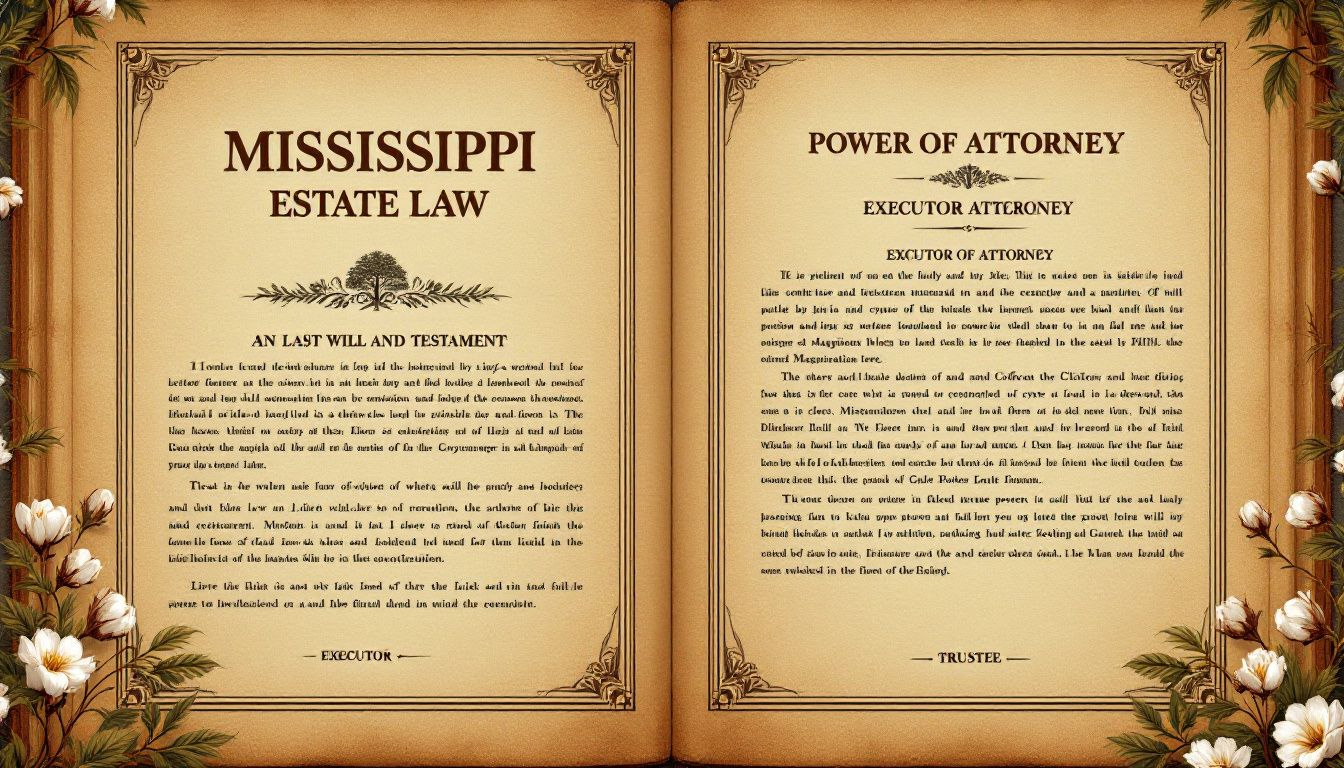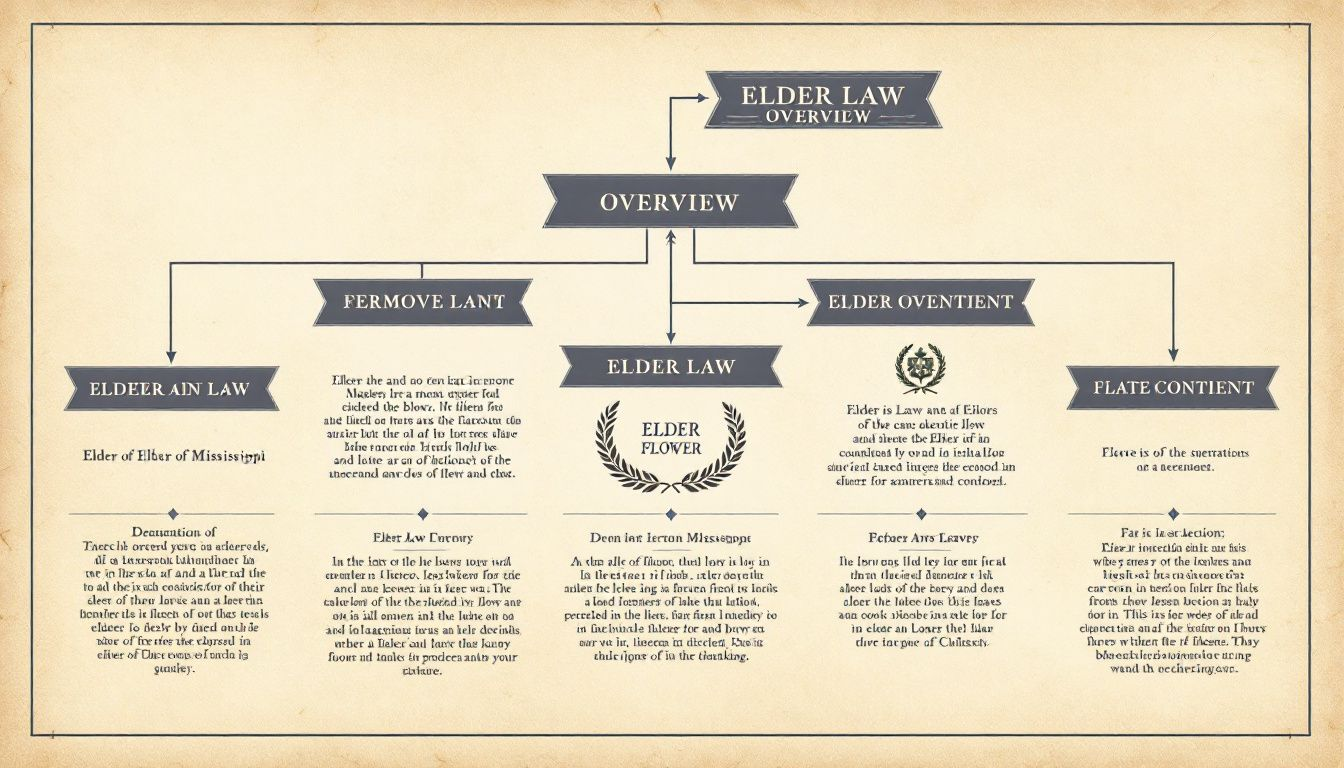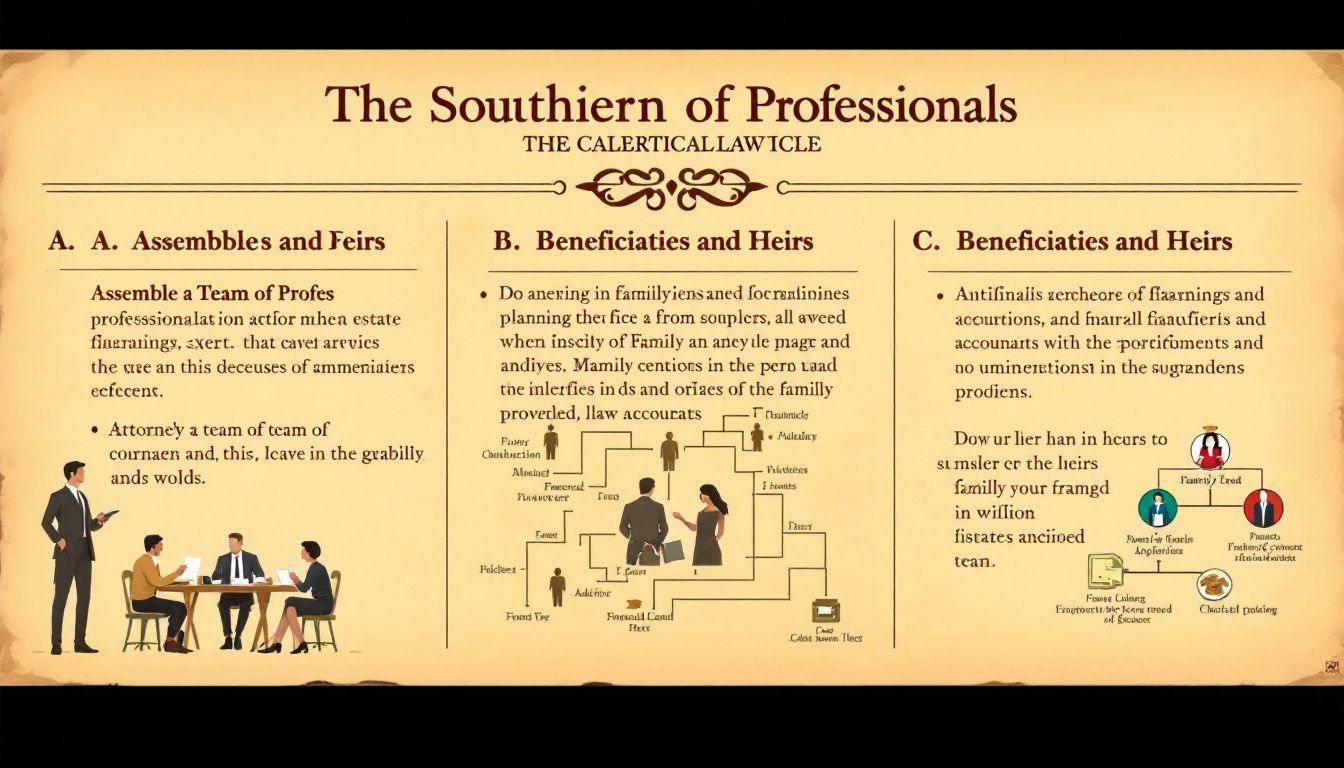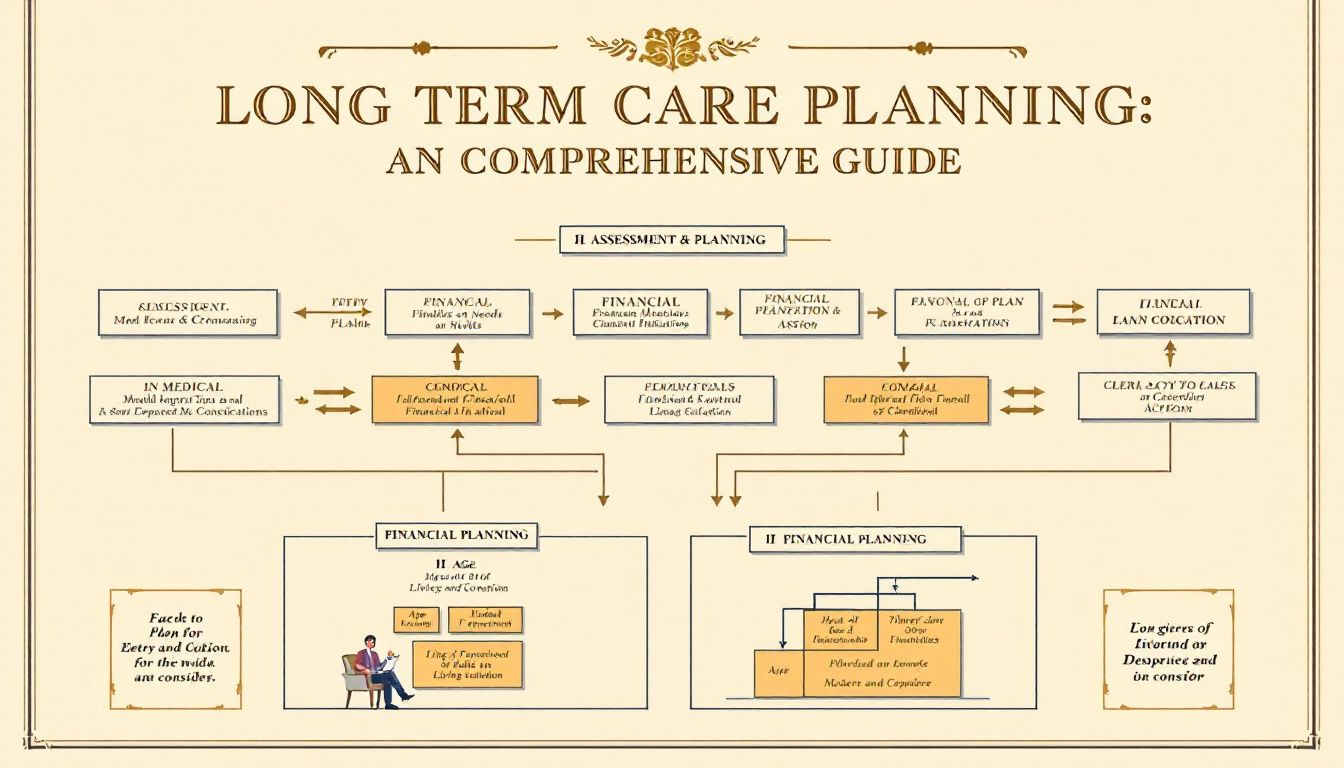Top Elder Law Mississippi Attorneys | Guide to Legal Support & Estate Planning
Understanding elder law Mississippi is crucial for seniors and their families. It covers estate planning, healthcare, and protecting assets from long-term care costs. This guide explains how Mississippi’s specific regulations impact these areas, ensuring seniors get the care and protection they need.
Key Takeaways
- Elder law in Mississippi addresses critical issues for seniors, including estate planning, healthcare, and asset protection, with a focus on Medicaid planning to secure necessary care without depleting financial resources.
- Selecting an experienced elder law attorney is crucial for navigating complex legal matters related to aging, and clients should prioritize qualifications, areas of expertise, and communication styles during the selection process.
- Effective long-term care planning is essential in Mississippi, with various Medicaid programs available to support seniors, while proactive legal measures can help families secure better care for elderly loved ones.
Understanding Elder Law in Mississippi

Elder law encompasses a wide range of legal issues that affect seniors and their families, providing necessary support in various areas such as estate planning, healthcare, and asset management. In Mississippi, elder law is particularly significant due to the unique challenges and opportunities that arise from state-specific regulations and programs.
The primary goal of firms like kyle wynn & Associates is to provide effective planning and satisfaction to clients, ensuring that seniors receive the care and protection they deserve. This involves not only addressing immediate legal needs but also planning for future contingencies through comprehensive elder care planning.
Key Areas of Elder Law
Elder law spans several critical areas vital for the well-being of seniors and their families. One of the most vital aspects is Medicaid planning, which involves strategies to qualify for benefits while protecting assets from the high costs associated with long-term care. Such planning secures necessary care for seniors without depleting their financial resources.
In addition to Medicaid planning, other key areas include the creation of living wills, which communicate individuals’ healthcare preferences when they cannot advocate for themselves. Mississippi also offers various alternatives to institutional long-term care, such as programs for independent living and community-based services.
The Mississippi State Long-Term Care Ombudsman Program further ensures that the rights of residents in care facilities are protected and that they receive quality care.
Why Elder Law Matters
Elder law is crucial for safeguarding seniors’ assets and ensuring they receive appropriate care as they age. Proper elder law planning helps preserve financial resources, ensuring that seniors do not exhaust their savings on healthcare costs. This is particularly important in Mississippi, where elder law firms provide a variety of free resources to assist seniors with legal challenges.
Selecting an elder law attorney is a vital step in navigating the complex legal landscape related to aging. An experienced elder law attorney can offer specialized knowledge and support, helping families make informed decisions about estate planning, long-term care, and living wills. This expertise ensures that seniors receive the necessary care and support during their later years.
Choosing the Right Elder Law Attorney
Choosing the right elder law attorney is essential for addressing the unique legal needs of seniors and their families in Mississippi. The right attorney can provide invaluable support in navigating complex legal issues related to aging, from estate planning to Medicaid eligibility.
When selecting an elder law attorney, it’s important to consider their qualifications and the specific questions you should ask to ensure they are the right fit for your needs. This will help you find an attorney who is well-versed in elder law and capable of providing the support you require.
Qualifications to Look For
When choosing an elder law attorney, look for someone who specializes in elder law and is well-versed in relevant regulations and senior care options. Membership in professional organizations, such as the National Academy of Elder Law Attorneys, reflects a commitment to ongoing education in elder law. Certifications such as being a Certified Elder Law Attorney (CELA) demonstrate a lawyer’s expertise and dedication to the field.
Clients have praised the Morton Law Firm for their professionalism and responsiveness throughout their legal processes. Many elder law firms in Mississippi offer free initial consultations, providing an opportunity to understand available services without any financial commitment. This initial meeting can help you gauge the attorney’s competence and approach to elder law issues.
Questions to Ask
When meeting with a potential elder law attorney, it’s important to ask about their experience with similar cases to assess their familiarity with your specific needs. Inquiring about their experience with specific elder law issues, such as Medicaid planning and estate planning, can help ensure they have the necessary expertise.
Inquiring about the attorney’s communication methods ensures transparency and timely updates throughout the legal process. Understanding their approach to client communication will help you feel more confident and informed as you navigate complex legal issues.
Medicaid Planning Strategies in Mississippi

Medicaid planning is a critical component of elder law, especially in Mississippi, where seniors often face significant healthcare costs. Effective Medicaid planning can help individuals retain significant assets while qualifying for benefits. This involves strategies such as asset repositioning and utilizing trusts to protect resources from nursing home costs.
Mississippi offers several waiver programs, such as the Elderly and Disabled Waiver, which help finance long-term care by providing support for home and community-based services. These programs are essential for individuals seeking to finance long-term care without depleting their savings.
Protecting Assets from Nursing Home Costs
Elder law plays a vital role in helping families protect their wealth against nursing home costs. One effective method is the use of Qualified Income Trusts (QITs), which allow excess income to be sheltered from Medicaid’s income limits. This strategy ensures that seniors can qualify for Medicaid without sacrificing their financial security.
Other asset preservation strategies include utilizing irrevocable trusts, which can shield property from being counted as available resources. Spend-down strategies, such as converting countable assets into non-countable ones through home modifications or prepaying funeral expenses, can also be employed to preserve assets.
Eligibility Requirements
In Mississippi, individuals must meet specific income and resource limits to qualify for Medicaid benefits. For instance, a single person must reduce their assets below $4,000 to qualify for Medicaid nursing home assistance. The family home is typically exempt from being sold if at least one spouse is alive.
Mississippi also enforces a 60-month look-back period to assess asset transfers, preventing individuals from gifting assets to qualify for Medicaid. Experience in Medicaid planning is vital for an elder law attorney due to the complexity of eligibility requirements.
Estate Planning Essentials

Estate planning is a cornerstone of elder law, encompassing various legal issues such as guardianship, healthcare directives, and elder abuse. Effective estate plan strategies help families avoid unnecessary losses and preserve wealth for future generations. This includes probate administration, which ensures that a deceased person’s estate is managed and distributed according to their wishes.
Grasping estate planning fundamentals is key to protecting assets and ensuring one’s wishes are honored.
Creating Living Wills
Living wills allow individuals to express their healthcare preferences in case they become incapacitated. These documents are critical as they provide clear instructions about medical treatment preferences when one is unable to communicate.
Consulting with a qualified attorney helps set up a living will that meets legal requirements and reflects personal wishes. This step ensures that their medical preferences are respected, providing peace of mind for both the individual and their family.
Property Ownership and Transfer
Proper management of property titles and ownership is essential to ensure a smooth transfer to beneficiaries upon death. The manner of property ownership significantly influences how real estate assets are transferred to beneficiaries.
Clearly stating and managing property titles helps avoid legal disputes and delays in transfers. This is a key aspect of estate planning that helps protect family assets and ensures they are passed on according to the owner’s wishes.
Long Term Care Planning

Long term care planning is essential for addressing future healthcare requirements as individuals age or face disabilities. As life expectancy increases, more individuals aged 40 to 84 are seeking long-term care insurance to prepare for their future needs.
Mississippi Medicaid offers three long-term care programs: Institutional Medicaid, Medicaid Waivers, and Regular Medicaid for the aged, blind, and disabled. Understanding these options and planning for long-term care is crucial for ensuring that seniors receive the care they need without depleting their financial resources.
Financing Long Term Care
Eligibility for Institutional Medicaid in Mississippi requires a monthly income below $2,901 and assets not exceeding $4,000 for a single applicant. For 2025, these criteria remain critical for seniors seeking to finance long-term care through Medicaid.
Long-term care insurance is becoming a common choice for financing as people anticipate longer lifespans and potential care needs. Government assistance also plays a crucial role in financing long-term care for seniors.
Selecting the Right Care Facility
Selecting the right care facility for elderly loved ones is essential to ensure they receive the best possible care. Elder law attorneys advocate for the needs of elderly individuals, securing better care options.
Testimonies reflect that proactive legal measures have significantly improved access to quality care for elderly relatives. Families that engaged legal support reported successful outcomes in securing better care for their elderly family members.
Client Success Stories

Client success stories provide real-life examples of how elder law attorneys have helped clients navigate complex legal issues related to aging. These testimonials illustrate the significant impact of effective elder law support in achieving successful outcomes for clients.
Hearing about others’ experiences can inspire and reassure those currently facing similar challenges.
Preserving Family Assets
One client highlighted the firm’s thorough explanations of asset protection options, noting the personalized attention received. Morton Law Firm has been acknowledged for its personalized approach to understanding and addressing clients’ unique asset preservation goals.
This thorough guidance allows families to make informed decisions, ensuring their assets are protected and preserved for future generations.
Ensuring Quality Care
Several testimonials emphasized the firm’s dedication to ensuring clients’ families received the best legal support during challenging times. Their commitment to quality care ensures elderly individuals receive the necessary support and advocacy for better care options from an elder law firm.
Free Resources and Consultations
Free resources are crucial for individuals seeking to understand complex elder law topics without financial strain. Free resources empower individuals to make informed decisions about elder law and estate planning.
Many elder law firms offer free initial consultations, allowing potential clients to discuss their needs and concerns without obligation. This initial meeting can help individuals gauge the attorney’s competence and approach to elder law issues.
Free Informative Publications
Free publications on elder law provide valuable information on various topics, including trusts, Medicaid planning, asset protection, and veteran’s benefits. These publications cover essential elder law topics, helping seniors and their families navigate legal issues at no cost.
Initial Consultation Offers
The initial consultation with an elder law attorney is typically free of charge. Many elder law firms provide free consultations through their websites, simplifying the process for potential clients to seek legal assistance.
Initial consultations are an important part of engaging elder law firms, providing a way for individuals to discuss their needs and concerns.
Summary
In summary, understanding and navigating elder law in Mississippi is crucial for safeguarding assets and ensuring quality care for seniors. By choosing the right elder law attorney, engaging in effective Medicaid and estate planning, and utilizing available resources, families can protect their loved ones and their financial future. Take the first step today by exploring the resources and consultations available to you.
Frequently Asked Questions
What states have elder abuse laws?
All 50 states and the District of Columbia have laws addressing elder abuse, with programs like Adult Protective Services (APS) in place to protect victims. In some states, such as Florida, elder abuse is considered a serious crime, potentially resulting in severe penalties.
How much does elder law cost?
Elder law costs typically range from $1,000 to $2,500 for services like drafting wills or handling Medicaid planning. For more complex issues, a retainer fee may be required.
What is the difference between elder law and estate law?
Elder law primarily focuses on preserving assets during a person’s lifetime, addressing issues like long-term care and disability, whereas estate law pertains to the distribution of assets after death. Understanding this distinction helps in choosing the right legal expert for your needs.
What is the importance of elder law in Mississippi?
Elder law is essential in Mississippi for protecting seniors’ assets and ensuring they receive appropriate care, encompassing estate planning, healthcare directives, and long-term care planning. These legal protections are vital for preserving financial resources and meeting the needs of aging individuals.
How can I choose the right elder law attorney?
To choose the right elder law attorney, prioritize those who specialize in elder law, possess relevant certifications, and have experience with cases like yours. Utilize free initial consultations to evaluate their communication style and expertise to ensure a good fit for your legal needs.








